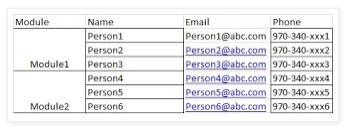I've been following a tutorial by this website: http://santanuboral.blogspot.com/2017/02/display-records-with-rowspan-in.html as it has been the exact requirement I am looking for.
But I really want to practice incorporating latest technology from Salesforce, which is Lightning Web Components (LWC). So I've been trying to convert it to LWC. After multiple research, I have been able to create something. But upon deploying it on my devhub org and displaying it through a lightning tab, only the header part are displayed. There are no data on the body part.
Here's what I achieved so far:
contactLWC.html
<template>
<table class="slds-table slds-table_cell-buffer slds-table_bordered ">
<thead>
<tr class="slds-line-height_reset">
<th class="" scope="col">
<div class="slds-truncate" title="contactModule">Module</div>
</th>
<th class="" scope="col">
<div class="slds-truncate" title="contactName">Name</div>
</th>
<th class="" scope="col">
<div class="slds-truncate" title="contactEmail">Email</div>
</th>
<th class="" scope="col">
<div class="slds-truncate" title="contactPhone">Phone</div>
</th>
</tr>
</thead>
<tbody>
<template if:true={mapData}>
<template for:each={mapData} for:item="keyValue">
<tr key={keyValue.key} class="slds-hint-parent">
<th scope="col">
<div>{keyValue.key}</div>
</th>
<template for:each={keyValue.value} for:item="value">
<div key={value.Name}>
{value.Name}
</div>
<div key={value.Email}>
{value.Email}
</div>
<div key={value.Phone}>
{value.Phone}
</div>
</template>
</tr>
</template>
</template>
</tbody>
</table>
</template>
contactLWC.js
import { LightningElement, track, wire } from 'lwc';
import getDataFromApex from '@salesforce/apex/ContactController.getData';
export default class contactLWC extends LightningElement {
@track mapData = [];
@wire(getDataFromApex)
wiredcontactdata({ data, error }) {
if (data) {
for(let key in data) {
if (data.hasOwnProperty(key)) {
this.mapData.push({key: key, value: data[key]});
}
}
} else if (error) {
window.console.log(error);
}
}
}
ContactController.cls
public class ContactController{
public ContactController()
{
}
@AuraEnabled(cacheable=true)
public static List<String> getData()
{
Map<String, List<ContactWrapper>> mapModule = new Map<String, List<ContactWrapper>>();
Map<String, Integer> moduleCountMap = new Map<String, Integer>();
List<String> moduleList = new List<String>();
List<Contact> contactList = [SELECT Name, Email, Phone, Module__c
FROM Contact
WHERE Module__c != null
ORDER BY Module__c];
for(Contact contObj:contactList)
{
List<ContactWrapper> conWrapperList = new List<ContactWrapper>();
if(mapModule.containsKey(contObj.Module__c))
{
conWrapperList = mapModule.get(contObj.Module__c);
conWrapperList.add(new ContactWrapper(contObj));
mapModule.put(contObj.Module__c, conWrapperList);
moduleCountMap.put(contObj.Module__c, conWrapperList.size());
}
else
{
conWrapperList.add(new ContactWrapper(contObj));
mapModule.put(contObj.Module__c, conWrapperList);
moduleCountMap.put(contObj.Module__c, conWrapperList.size());
}
}
moduleList = new List<String>(mapModule.keySet());
return moduleList;
}
public Class ContactWrapper {
public ContactWrapper(Contact contObj)
{
this.Name = contObj.Name;
this.Email = contObj.Email;
this.Phone = contObj.Phone;
this.Module = contObj.Module__c;
}
public String Name {get;set;}
public String Email {get;set;}
public String Phone {get;set;}
public String Module {get;set;}
}
}
Would really appreciate anyone's help. Hope someone could help me on this.

